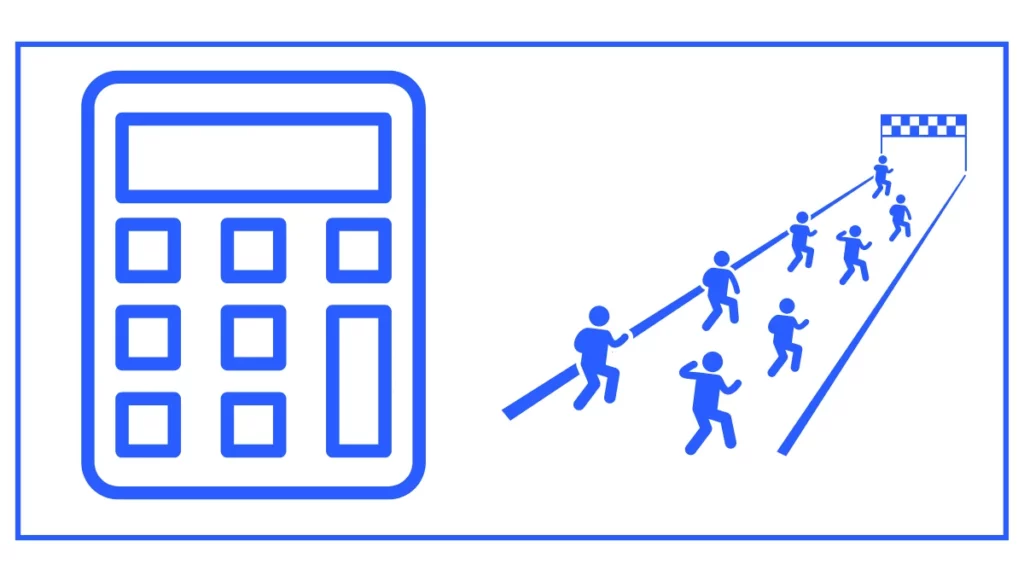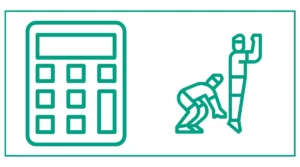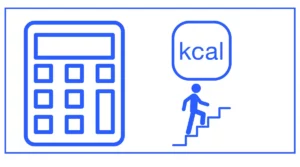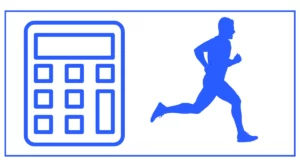Marathon Calculator
Speed:
Pace:
Did you take part in a recent marathon race?
OR
Are you preparing for the next marathon and want to calculate your speed and pace using distance and time?
This marathon 🏃 calculator helps you calculate your marathon race parameters easily.
All you need to do is to enter the marathon distance and time. You can also choose the event type from the drop-down menu. Once you choose that, the distance tab will be automatically filled.

You might be interested in finding your Race Time Improvement or race pace.
What is a Marathon Calculator?
A Marathon Calculator is a specialized tool designed to help runners plan, train for, and predict their performance in a marathon. This easy-to-use calculator can be utilized for various purposes, from determining training paces to estimating finish times for the 26.2-mile (42.195 km) distance.
At its core, our Marathon Calculator operates on the relationship between distance, time, and pace specific to the marathon distance. By inputting any two of these variables, the calculator can determine the third. For instance:
- If you know your desired finish time, the calculator can determine your required pace per mile or kilometer.
- If you know your average pace, it can calculate your projected finish time.
- If you have a specific time goal, it can break down your race into manageable segments with target split times.
Benefits of Using a Marathon Calculator
1. Training Optimization
A Marathon Calculator helps you plan your marathon training more effectively. By inputting your goal marathon time, you can determine the pace you need to maintain during different types of workouts, such as:
- Easy long runs
- Marathon-pace runs
- Tempo runs
- Interval training
This information allows you to train at the appropriate intensity, maximizing your endurance while minimizing the risk of overtraining.
2. Race Preparation
When preparing for a marathon, this calculator can be your best friend. It allows you to:
- Set realistic time goals based on your current fitness level
- Break down your marathon into manageable segments
- Plan your pacing strategy for optimal performance
For example, if you’re aiming to run a marathon in 4 hours, the calculator can tell you that you need to maintain a pace of approximately 5 minutes and 41 seconds per kilometer or 9 minutes and 9 seconds per mile.
3. Progress Tracking
By regularly using a Marathon Calculator, you can easily track your progress over time. As your fitness improves, you’ll see your projected finish time decrease for the same perceived effort in your training runs.
4. Race Time Prediction
Many runners use Marathon Calculators as race time predictors. By inputting your performance from a recent half marathon or other race distance, the calculator can estimate your potential marathon finish time. While these predictions aren’t always 100% accurate due to factors like terrain and weather conditions, they provide a good starting point for setting realistic marathon goals.
How to Use our Marathon Calculator
Using a Marathon Calculator is straightforward. Here’s a step-by-step guide:
- Choose your preferred units (miles or kilometers).
- Select the type of calculation you want to perform (pace, time, or splits).
- Input the known variables.
- Click “Calculate” to get your result.
For example, let’s say you want to calculate your required pace for a 4-hour marathon:
- Select “Marathon” as your distance.
- Enter “4:00:00” as your goal time.
- Click “Calculate.”
- The calculator will show your required pace as 5 minutes and 41 seconds per kilometer or 9 minutes and 9 seconds per mile.
Advanced Features of Marathon Calculators
While basic pace calculations are useful, many modern Marathon Calculators offer additional features to enhance your marathon training and racing experience.
1. Training Pace Recommendations
Advanced calculators may provide recommended paces for different types of training runs based on your marathon goal time. These might include:
- Easy run pace
- Long run pace
- Marathon pace runs
- Tempo run pace
- Interval training paces
2. Split Time Calculator
A useful feature of Marathon Calculators is the ability to generate split times for your race. This can help you pace yourself evenly throughout the marathon and avoid starting too fast.
3. Elevation Adjustment
For runners training or racing on hilly marathon courses, some calculators offer elevation adjustment features. These take into account the impact of hills on your pace, providing more accurate predictions and recommendations.
4. Race Equivalency Predictions
Some Marathon Calculators can predict your potential finish times for various race distances based on your marathon time. This feature is particularly useful when setting goals for shorter races during your marathon training cycle.
Using a Marathon Calculator for Different Phases of Training
Let’s explore how a Marathon Calculator can be utilized throughout your marathon journey:
Base Building Phase
During the early stages of marathon training, use the calculator to:
- Determine appropriate paces for your easy runs and long runs
- Set realistic interim goals for shorter race distances
Specific Marathon Training Phase
As you enter the core of your marathon training:
- Use the calculator to determine paces for marathon-specific workouts
- Regularly update your goal time based on your progress in training
Taper and Race Preparation
In the weeks leading up to your marathon:
- Fine-tune your goal time and pacing strategy
- Calculate split times for different segments of the race
Other Uses for Marathon Calculator
While primarily designed for marathon training, these calculators can be useful for other endurance events as well:
- Ultramarathons: Estimate finish times for longer distances
- Half Marathons: Calculate equivalent paces and finish times
- Triathlon: Plan pacing strategies for the running portion of longer distance triathlons
Limitations of Marathon Calculators
While Marathon Calculators are incredibly useful tools, it’s important to understand their limitations:
- They don’t account for external factors like weather, course profile, or cumulative fatigue over 26.2 miles.
- Predictions are based on mathematical models and may not perfectly reflect individual performances.
- They can’t replace the importance of listening to your body during training and racing.






